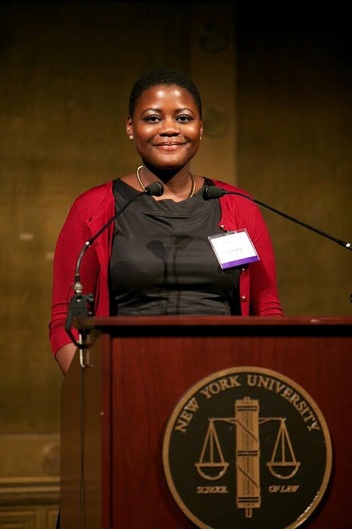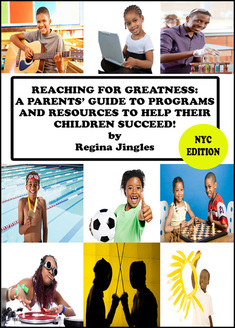One of the more challenging areas in the legal profession is public interest law. While it may not have the same allure or high salary, it's also the one branch of law that attracts some of the most dedicated and selfless individuals around.
Chant'a Parker, a proud Spelman and NYU School of Law graduate is just that kind of lawyer. As a public defender based in NY, Parker has been known to "go the distance" when others would rather give up and quit. In this interview, Parker describes her interest in public defense law and why she hopes that more young people-of-color seriously consider it as a career.
Q1. Please discuss your work: What do you do and how long have you been at it?
A. I am a public defender. That means that I am a lawyer who fights for people who are charged with crimes and cannot afford to hire an attorney. I'm usually in court advocating on behalf of my clients, meeting with clients, or out in the community investigating cases. I have been a public defender for about six years now and have been an attorney for about eight.
Q2. What led you to become a public defender? What do you enjoy most about this line of work?
A. I became a public defender because it was a job that was most in line with the lawyers I admired growing up: folks who were a part of the community, represented the community, and fought for people in the community.
I like helping people, especially those who are the most overlooked in our society. I enjoy getting to know my clients and their families and helping them solve problems.
Q3. Why did you choose to attend NYU School of Law? What did you enjoy most there?
A. I chose NYU because it was in New York City and because it had a nationally-recognized public interest law program.
I knew that I would get the best training while making critical connections in the field in one of the best cities in the world. I loved being a part of the community of Black students at NYU. As a graduate of an HBCU, I instinctively looked to this community for support and fellowship on NYU's campus.
Q4. You're a proud Spelman graduate. Please describe your experience there, and what advice do you have for parents whose girls may wish to attend?
A. Spelman was the place where I gained confidence in myself as a Black woman because I was surrounded by so many smart, beautiful, and kind Black women who came from diverse backgrounds. I quickly learned that not all Black women are the same but that we each bring a unique perspective to this world and that we can celebrate each other's glory rather than tear each other down.
I would encourage any parent whose daughter wants to attend Spelman to do everything you can to support her in that decision. My journey through Spelman's gates was made possible by the support of my family who made sure I was prepared for the academic and personal challenges that college brings. No matter what challenges I faced, I knew that my family was a call away and that they would do whatever it took to make sure I graduated from Spelman.
Q5. Given the work load, the challenges and the salary of a public defender, coupled with the "high cost" of attending law school, how would you best make the case to take on this career path?
A. There is nothing more rewarding than standing with a young man when a "not guilty" verdict is read, walking a young woman out of court after her charges are dismissed, or successfully advocating for a more reasonable sentence in difficult cases. These moments make all of the sacrifices worth it.
Granted, there are some personal financial decisions I would have made differently to better prepare for the financial realities of life as a public defender. However, I still believe that this is one of the most rewarding legal careers, especially for young people-of-color, and so I'm committed to helping those that come behind me make better choices as they consider entering the profession.
Q6. For parents whose kids may want to go into law, what are some of the challenges and how should they best prepare for this field?
A. One of the challenges is the academic rigors of law school. I've found that some law students, especially students-of-color or students, who are not familiar with the legal profession, underestimate the extreme mental, physical, and emotional demands that are placed on law students.
The best way to alleviate these demands are for students to be informed about what law school is really all about. The best skill that a kid can have if they want to go to law school in the future, is a love of reading and good critical thinking abilities.
Q7. Are there any particular "personality traits" that parents might notice about their kids that would make for a good lawyer?
A. I've found that all kinds of personalities are attracted to (and excel in) the profession, just as all kinds of personalities need a good lawyer; especially, because there are many different areas of law that one can go into.
That said, being open-minded, flexible, and dedicated to your craft are excellent traits for any lawyer.
Q8. Are there any high school programs that you know of for kids thinking about becoming a lawyer?
A. I attended a legal magnet high school. This program was helpful in showing me what it would be like to be a lawyer because I got to participate in several internships and mock trial programs. I'd suggest parents check to see if their local school system has similarly targeted programs.
Q9. Describe your work with "Gideon's Promise" and how this relates to public defense work?
A. Through Gideon's Promise, I train and mentor new public defenders in the South. Each year, I attend the Summer Training Institute and work with the phenomenal group of lawyers who are changing the culture of public defense across the South.
I love this work because I am able to share my experience as a public defender in New Orleans and New York with new attorneys and become rejuvenated by the positive energy the new lawyers bring. Gideon's Promise is one of the main reasons why I continue to do this work. The community is unparalleled and provides me with an amazing support system.
Q10. Is there anything else that you would like to share?
A. Being a public defender is the most exciting, exhilarating, and challenging thing that I have done thus far in my life. I'm committed to encouraging and supporting young people-of-color to become public defenders because of the rewarding experience that I have had, and the transformative power I believe young attorneys-of-color can have on the criminal justice system.
Readers interested in learning more about public interest law or the work of Gideon's Promise, can follow their respective Twitter accounts: @ChantaParkerPD and @gideonspromise.


 RSS Feed
RSS Feed